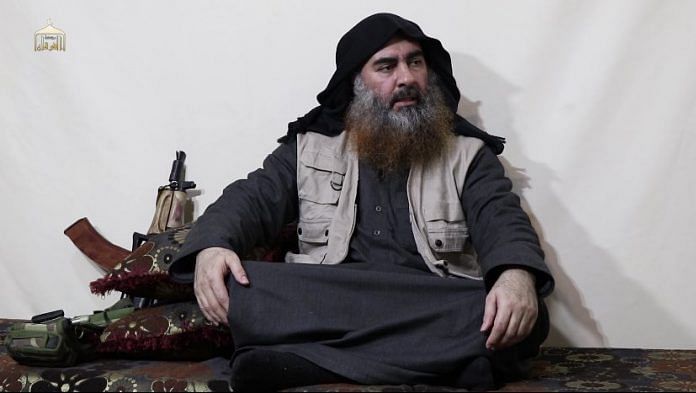New Delhi: The re-emergence of Abu Bakr al-Baghdadi, the self-proclaimed caliph of the Islamic State in Iraq and the Levant (ISIL), in a video where he claimed responsibility for the Sri Lankan bombings, has evoked considerable concern worldwide.
Baghdadi, 48, who Forbes magazine has listed as the world’s 54th most powerful man, was seen in the 18-minute video talking about the “battle of attrition” that his group is fighting for. “There will be more to come after this battle,” he added.
“Truthfully, the battle of Islam and its people against the cross and its people is a long battle,” Baghdadi said in the video, where he is seen sitting with an assault rifle and talking to three of his aides.
The authenticity of the video has not been ascertained yet and it is still unclear when it was shot.
Baghdadi also referred to the Battle of Beghouz, in which the Islamic State of Iraq and Syria (ISIS) lost its last bastion in February. According to Rukmini Callimachi, a correspondent for The New York Times covering ISIS, Baghdadi has referred to the Sri Lanka suicide bombings as revenge for Beghouz.
“Baghdadi praises the attackers in Sri Lanka, calling their combined murder revenge for Baghuz. This is significant because everyone from the Sri Lankan government to prominent journalists fell for *unofficial* statements from ISIS fanboys calling it revenge for Christchurch,” Callimachi said in a tweet, referring to the terror attacks in New Zealand that took place on 15 March.
In an article, award-winning journalist Patrick Cockburn wrote: “Al-Baghdadi is important as a symbolic leader, but the history of the past five years shows that he was never a very capable strategist.”
Who is Abu Bakr al-Baghdadi?
Baghdadi, also known as Abu Dua, caught the world’s attention in 2014 with his barbaric style of execution and blood-thirsty campaigns. This brought him to the attention of Forbes, which twice featured him in its list of most powerful people. In 2014, he was ranked 54th and in May last year, he was in the 73rd spot.
Born in 1971 in Sammara, Iraq, Baghdadi was named Ibrahim Awwad Ibrahim al-Badri by his parents who led a frugal life. His father was a teacher of Quranic recitation in a local mosque and a religious man.
Since his early days, Baghdadi would spend his free time learning Quranic verses and follow each and every direction laid out in the holy book. As a result, his family soon started to call him by the nickname “the believer”.
As a child, Baghdadi was “withdrawn, taciturn and when [he] spoke, barely audible”, wrote William McCants, a fellow in the Center for Middle East Policy and director of the Project on US Relations with the Islamic World.
Also read: Islamic State has collapsed, but the ground is still fertile for a new reign of terror
Love for football
McCants, who is a former senior adviser on countering violent extremism at the US State Department, gave a detailed description of how Baghdadi was passionate about football.
After his daily prayers at Haji Zaydan mosque where he recited the azaan, Baghdadi would play football at a club in the mosque where people would refer to him as “our Messi”, comparing him to the Argentinian football star Lionel Messi. But even then, wrote McCants, Baghdadi would quickly lose temper if he failed to score.
Having obtained his doctorate degree in Quranic studies from Saddam University for Islamic Studies in 2007, Baghdadi joined the Salafist movement of Sunni Islam that was rooted in Saudi Arabia, which preached a return to the original ways of leading an Islamic life as was practised by the Prophet or following the “pious predecessors”.
His transformation
The invasion of Iraq in 2003 by US-led forces had a profound impact on Baghdadi and radicalised him even more. It was at this time that Baghdadi founded Jaysh Ahl al-Sunna wa-l-Jamaah (Army of the People of the Sunna and Communal Solidarity), an insurgent group that fought US forces in northern and central Iraq, after which he got arrested in February 2004, wrote McCants.
However, Baghdadi’s operations began mainly from 2010 onwards when he became the leader of the al-Qaeda in Iraq. Eventually, in 2011, he led a revolt in Syria leading to the germination of ISIS. By 2013, he started to control vast swathes of territory in northern Syria and Iraq, according to Patrick Cockburn’s book The Rise of Islamic State.
According to Cockburn, who works for The Independent, Baghdadi rose to power in 2013 and soon established himself as an “effective albeit elusive leader”.
Before his video was released on 29 April by the ISIL’s Al Furqan media network, Baghdadi was last seen in a July 2014 video in which he had declared himself as the caliph (chief Muslim civil and religious leader) of ISIL at the Great Mosque of al-Nuri in Mossul.
Baghdadi is believed to be suffering from diabetes now. He has a $25 million bounty on his head.
But in November 2014, he was thought to have been killed during an US air strike in Iraq when he was traveling in an ISIS convoy. The US airstrikes had hit Mosul and Al-Qalm that time.
The then defence minister of Iraq Khalid al-Obaidi said that Baghdadi was “wounded” in an allied forces air raid, while confirming the death of his deputy Abu-Muslim al-Turkumani.
Also read: Sri Lanka blasts: A dangerous resurgence of the ISIS



